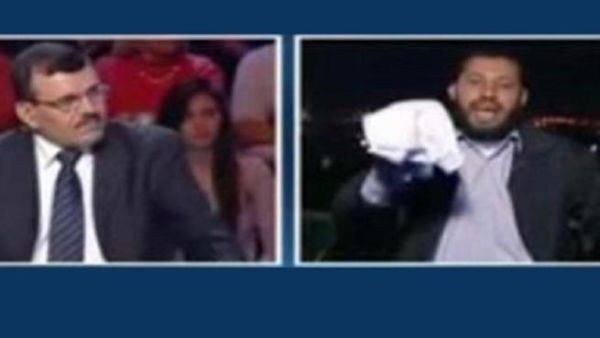Tunisian viewers were taken shocked when a Salafi cleric called upon Muslim youths to carry out jihadist acts against the government in a live TV show this week.
Tunisian analysts warned of the consequences of a growing militant discourse that has prevailed after the revolution.
Nasr al-Din al-Alawi, a Salafi cleric and imam, was shown in a TV interview (in the presence of Interior Minister Ali Larayed) brandishing a white cloth, used to represent a coffin, as a sign that he is willing to sacrifice his life.
He then called upon Salafi youths in Tunisia to do the same and to declare jihad against the ruling al-Nahda party and the minister, who is also a member of the party.
Tunisian experts found the incident alarming and launched an initiative in the weekly Assabah newspaper, which called upon al-Nahda to choose between what they termed “the coffin campaign” and the promotion of freedom and progress.
They lashed out at the ruling party for its attempts to woo the ultra-conservative Islamists and warned of the grave consequences of overlooking actions that incite violence like Alawi’s.
Political analyst Salah al-Din al-Jurshi argued that all al-Nahda’s attempts at winning the Salafis to their side have failed.
“Salafis view al-Nahda as their enemy now and the coffin incident proves that they might think of escalation against the party and the troika government and which for them have lost their legitimacy,” he wrote.
Jurshi added that despite initiatives by several more moderate Salafi clerics to diffuse the tension between Salafis and the government, clashes are still likely to happen in the coming stage.
“This is because the Salafi discourse has not really changed,” he said.
Regarding the application of a law the entitles security forces to shoot at Salafi in case of violations, Jurshi said that while the law itself seems capable of restoring stability, violence has proven an inadequate way of solving such problems even if it is perpetrated by a legitimate government.
“This way of handling things proved a great failure when [former Tunisian president Zine El Abidine] Ben Ali tried it with al-Nahda.”
Professor of history and expert on Islamic studies Aliya al-Alani found confrontations between Salafis and the government unlikely to take place in the near future.
“After the coffin incident, many Salafis, as well as members of al-Nahda, hurried to mediate between Salafi zealots and the government because they think any confrontation will serve the interests of the seculars.”
Alani agrees with Jurshi as far as al-Nahda’s inability to contain the Salafi threat is concerned.
“If al-Nahda was capable of convincing the Salafis to tone down their rhetoric and renounce violence, why didn’t it do that several months ago when several politicians and intellectuals were subjected to attacks by Salafis?”
However, Alani argued that those attacks proved that Salafis are not as dangerous as they might appear to be because their numbers are much less than what is reported in the media.
“They are only a few hundreds, nothing more.”
Alani dismissed fears that al-Nahda would turn into a tyrannical entity and eventually create a regime similar to that of Ben Ali because al-Nahda’s allies are gradually diminishing and that is why it needs to deal wisely with the situation.
“The question is: has al-Nahda finally realized that its political future is not with the coffins bearers, but with the proponents of freedom and progress who promote the principles of equality and citizenship?” asked Alani.

Nasr al-Din al-Alawi, a Salafi cleric and imam, was shown in a TV interview brandishing a white cloth, used for a coffin, as a sign that he is willing to sacrifice his life.







